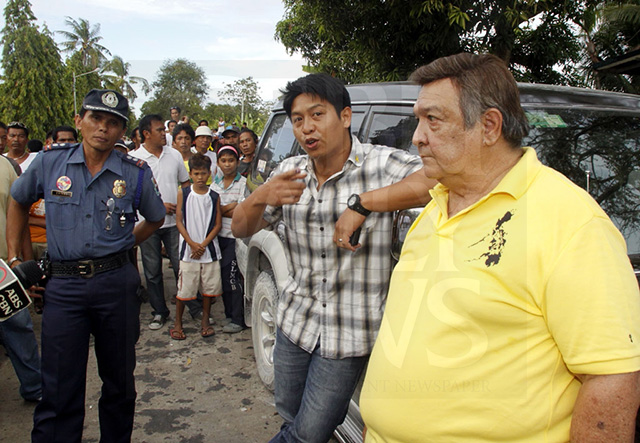
Provincial Board Member Celestino “Tining” Martinez III (center), then a congressional candidate, asks Supt. Julian Entoma to check the vehicle of political rival Benhur Salimbangon for possible presence of firearms in this 2010 file photo. His father, Bogo City Mayor Celestino “Junie” Martinez, Jr. listens. The standoff led to the filing of grave coercion charges against the Martinezes. (CDN FILE PHOTO)
Bogo City Mayor Celestino “Junie” Martinez, Jr. and two others are facing trial for allegedly blocking the convoy of their political rival during the 2010 elections.
The Office of the Ombudsman approved the filing of grave coercion charges in court against Martinez, Vice Mayor Santiago Sevilla, and Martinez’s son, lawyer Jose Carlo Martinez.
The anti-graft office, in a resolution posted on its website, said the Martinezes and their supporters “verbally abused” the group of Rep. Benhur Salimbangon and prevented them from leaving Polambato Elementary School.
The standoff during the May 10, 2010 elections lasted four hours.
Sought for comment yesterday, Martinez said he has yet to receive a copy of the Ombudsman’s resolution.
“I won’t issue any comment for now. I was only informed about this just now. But if ever that’s true, I’m willing to face trial,” he told Cebu Daily News.
The Cebu Provincial Prosecutors’ Office earlier indicted the respondents.
Ombudsman Conchita Carpio Morales, who reviewed the prosecution office’s findings, said there is sufficient basis to file charges in court against the respondents who are affiliated with the Liberal Party (LP).
“It is clear that when the complainants were prevented from moving their vehicles within the area of Palombato Road in Bogo City and respondents searched the vehicles of the complainants, there was such a display of material force which necessarily produced intimidation, and in effect, controlled the will of the complainants,” said Morales.
Under the Revised Penal Code, grave coercion is committed “by any person, without authority of law, shall, by means of violence, prevent another from doing something not prohibited by law, or compel him to do something against his will, whether it be right or wrong.”